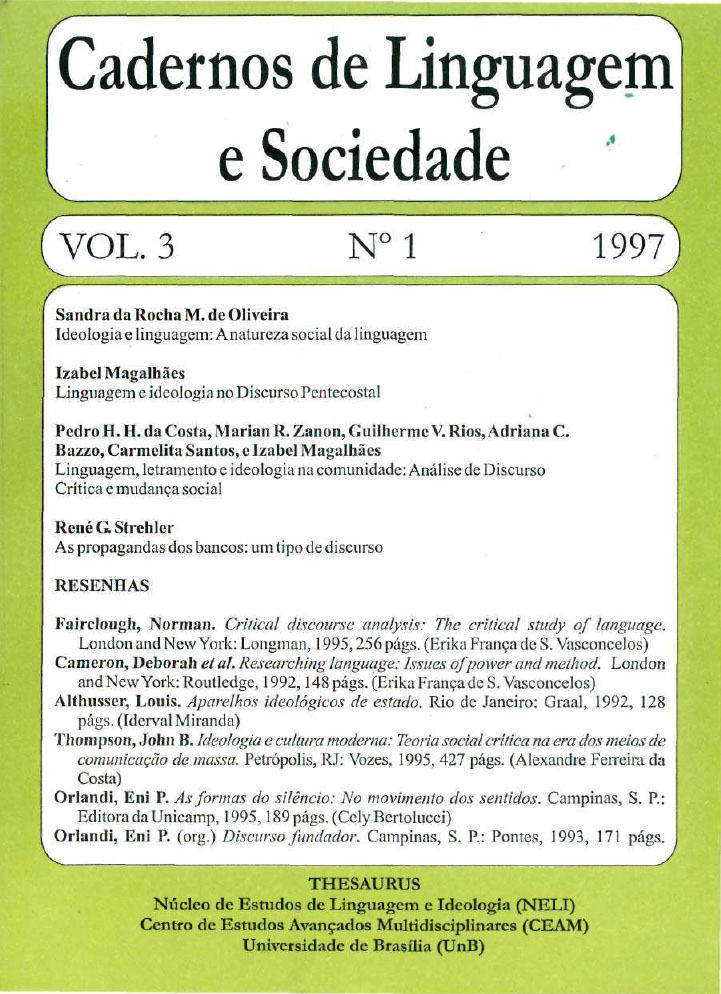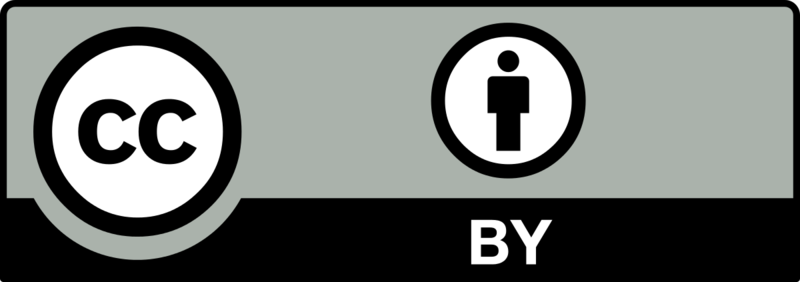Linguagem, letramento e ideologia na comunidade
análise de discurso crítica e mudança social
DOI:
https://doi.org/10.26512/les.v3i1.4051Resumo
The purpose of this paper is to discuss what people say about literacy in real text and in the relation holding among texts (intertextuality) in discursive literacy practices. An attempt is made to integrate the linguistic theory of Criticai Discourse Analysis with anthropological studies of literacy practices. The data analysed is part of a larger project concerned with the discourse of education. The data consists of texts written by learners and teachers in a community adult literacy programme. Some of these texts, among which is a short play, were written to celebrate the literacy teacher's day. The analysis of the play shows that an identity of 'trespassers' is constructed for the original migrant group that went to live in the community. In addition, the analysis of learners' texts indicates that learners often reproduce the dominant educational practice in Brazil, which is linked to hegemonic social groups. This is achieved by means of a 'disciplinary subject position' which is constituted for them. The analysis of the play suggests, however, that learners are aware of the unequal power relations to which they are subjected. Thus, a second subject position is defined in the play, that of the 'community subject'. Finally, this paper proposes the adoption of the principies subsumed in Criticai Language Awareness for the study of adult literacy, and further as a possible contribution to solve Brazilian educational problems.
Downloads
Referências
Althusser, L. Ideologia e aparelhos ideológicos do estado. Trad. J. J. de M. Ramos. 3a. ed. Lisboa: Editorial Presença, 1980.
Authier-Révuz, J. Hétérogénéité montrée et hétérogénéité constitutive: éléments pour une approche de 1'autre dans le discours. DRLAV, 32, 1982.
Bakhtin, M. M. Speech genres and other late essays. Trans. V. W. McGee. Ed. C. Emerson and M. Holquist. Austin: University of Texas Press, 1986.
Barton, D. The social nature of writing. In: D. Barton & R. Ivanic (eds.) Writing in the community. London: Sage Publications, 1991, pp. 1-13.
Barton, D. Literacy: an introduction to the ecology ofwritten language. Oxford, U.K. and Cambridge, U.S.A.: Blackwell, 1994.
Chauí, M. Conformismo e resistência: aspectos da cultura popular no Brasil. 4a. ed. São Paulo: Brasiliense, 1986.
Derrida, J. Limited Inc. Trad. C. M. César. Campinas, S. P.: Papirus, 1991.
Ducrot, O. Esboço de uma teoria polifônica da comunicação. In: O. Ducrot. O dizer e o dito. Campinas: Pontes, 1987, pp. 161-218.
Fairclough, N. Criticai Discourse Analysis. London: Longman, 1995.
Fairclough, N. Discourse and social change. Cambridge: Polity Press, 1992a. Fairclough, N. Introduction. In: N. Fairclough (org.) Criticai language awareness. London and New York: Longman, 1992b, pp. 1-29.
Fairclough, N. (ed) Language andpower. London: Longman, 1989.
Foucault, M. Arqueologia do saber. 3a. ed. Trad. L. F. Neves. Rio de Janeiro: Forense Universitária, 1987.
Foucault, M. Vigiar e punir: nascimento da prisão. Trad. L. M. P. Vassallo. 6a. ed. Petrópolis: Vozes, 1988.
Freire, P. Pedagogy of the oppressed. Trad. (americana) M. B. Ramos. New York: Herder and Herder, 1970.
Freitag, B. Escola, estado e sociedade. São Paulo: EDART, 1978.
Gadet, F. & Hak, T. (orgs.) Por uma análise automática do discurso: uma introdução à obra de Michel Pêcheux. Trad. B. S. Mariani et ai. Campinas, S. P: Editora da UNICAMP, 1990.
Giddens, A. Modernity and self-identity: selfand society in the late modem age. Cambridge: Polity Press, 1991.
Halliday, M. A. K. & Hasan, R. Language, context, andtext: aspects oflanguage in a social-semioticperspective. Oxford: Oxford University Press, 1985.
Hamilton, M., Ivanic, R. & Barton, D. Knowing where we are: participatory research and adult literacy. CLSL Working Paper, 29. Lancaster University, 1991.
Heath, S. B. Ways with words: language, life and work in communities and classrooms. Cambridge: Cambridge University Press, 1983.
Horsman, J. The problem of illiteracy and the promise of literacy. In M. Hamilton, D. Barton & R. Ivanic (orgs.) Worlds of literacy. Toronto: Institute for Studies in Education, 1993, pp. 169-181.
Ivanic, R. & Moss, W. Bringing community writing pratices into education. In: D. Barton & R. Ivanic (eds.). Writing in the community. Newbury Park, Califórnia: Sage Publications, 1991, pp. 193-223.
Janks, H. & Ivanic, R. Criticai language awareness and emancipatory discourse. In: N. Fairclough (ed.). Criticai language awareness, op. cit., 1992, pp. 305-331. Koch, I. Argumentação e linguagem. São Paulo: Cortez, 1987.
Kress, G. Linguisticprocesses in socioculturalpractice. Oxford: Oxford University Press, 1985.
Maingueneau, D. Novas tendências em análise do discurso. Trad. F. Indursky. Rev. trad. S. M. L. Gallo e M. da G. de D. V. de Moraes. Campinas: Pontes, 1989.
Magalhães, I. Processos Discursivos na Educação. Relatório de pesquisa. Universidade de Brasília / CNPq, 1996a.
Magalhães, I. A produção do sujeito na interação. In: I. Magalhães (org.) As múltiplas faces da linguagem. Brasília: Edunb, 1996b.
Magalhães, I. Práticas discursivas de letramento: a construção da identidade em relatos de mulheres. In: A. Kleiman (org.) Os significados do letramento: uma nova perspectiva sobre a prática social da escrita. Campinas, S.P: Mercado de Letras, 1995a, pp. 201-235.
Magalhães, I. Beliefs about literacy in a Brazilian community. InternationalJournal of Educational Development, 15(3): 263-276, 1995b.
Magalhães, I. A criticai discourse analysis of gender relations in Brazil. Journal of Pragmatics, 23: 183-197, 1995c.
Magalhães, I. & Gieve, S. Power, ethics and validity: Issues in the relationship between researcher and researched. Lancaster University, 1994 (1998).
Oliveira, S. R. M. de. A ideologia no discurso sobre drogas. Universidade de Brasília, dissertação de Mestrado inédita, 1992.
Orlandi, E. P. Terra à vista: discurso do confronto: velho e novo mundo. São Paulo: Cortez; Campinas, S.P.: Editora da UNICAMP, 1990.
Orlandi, E. P. As formas do silêncio: no movimento dos sentidos. Campinas, S.P.: Editora da UNICAMP, 1992.
Ratto, I. Ação política: fator de constituição do letramento do analfabeto adulto. In: A. Kleiman (org.) Os significados do letramento: uma nova perspectiva sobre a prática social da escrita. Campinas, S. R: Mercado de Letras, 1995, pp. 267-289.
Soares, M. Linguagem e escola: uma perspectiva social. São Paulo: Ática, 1986.
Soares, M. Alfabetização no Brasil: o estado do conhecimento. Brasília: INEP/San-tiago, REDUC, 1991.
Street, B. Literacy in theory and practice. Cambridge: Cambridge University Press, 1984.
Street, B. Introduction: The new literacy studies. In: B. Street (ed.) Cross-cultural approaches to literacy. Cambridge: Cambridge University Press, 1993, pp. 1-21.
Thomas, J. Doing criticai ethnograghy. Newbury Park, Califórnia: Sage Publications, 1993.
Thompson, J. B. Studies in the theory ofideology. Cambridge: Polity Press, 1984.
Thompson, J. B. Ideology and modem culture. Cambridge: Polity Press, 1990.
Downloads
Publicado
Como Citar
Edição
Seção
Licença
Autores/as que publicam nesta revista concordam com os seguintes termos:
Autores/as mantêm os direitos autorais e concedem à revista o direito de primeira publicação, sendo o trabalho simultaneamente licenciado sob a Creative Commons Attribution 4.0 International license que permite o compartilhamento do trabalho com reconhecimento da autoria do trabalho e publicação inicial nesta revista.



